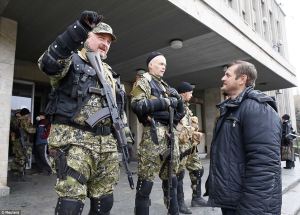The number of Russian military in Donetsk region is growing, according to the head of Anti-terrorist Center of the Security Service of Ukraine Vasyl Krutov, reports Interfax Ukraine.

"The day before yesterday [Sunday, ed.], there were 150 of the so-called “green men,” but yesterday another 300 arrived. I am not saying how many was there before. How many there will be tomorrow remains to be seen… For those professional militants to cross Ukraine’s border is as easy as for a kid to take a trip to the cinema," he told journalists at a military airfield on late Tuesday night. Krutov admitted that the Ukrainian military will have to deal with “highly trained and professional opponents.”
"We deal with a really serious, highly skilled and highly professional opponent. We must acknowledge that these people are very well prepared, knowledgeable and experienced – they have been involved in the hottest spots in the world and on their own territory,” he admitted.
Krutov stated that the anti-terrorist operation launched in the east of Ukraine is aimed at deterring aggression, not killing people. He declared that the Ukrainian forces have successfully prevented the capture of the Kramatorsk airfield, an operation carried out without any casualties.
"The goal of the operation is not revenge or physical harm to aggressors. We conduct only targeted actions, clearly focused and not aimed at killing or harming," Krutov said. The main goal of the anti-terrorist operation, he added, is to stabilize the situation in the country. "Our work is for the good, for peace and order in our country. We do everything we can to stabilize the situation and to protect the citizens," noted Krutov.
Earlier, the Security Service of Ukraine identified the leader of the Russian sabotage group deployed in Sloviansk. He is a Russian citizen and an officer of special forces of the Main Intelligence Department of the General Staff of the Armed Forces of the Russian Federation Igor Streltsov.
Source: http://www.pravda.com.ua/news/2014/04/16/7022580/
Translated by Olexii Pivtorak, edited by Mariana Budjeryn
